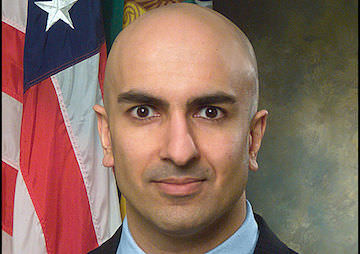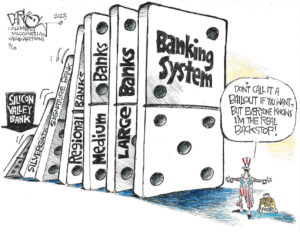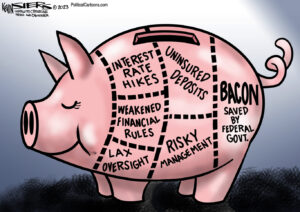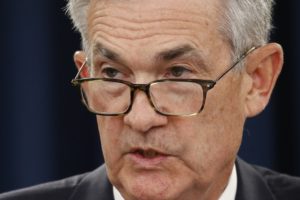Unlikely Critic Neel Kashkari Says Banks Still Pose ‘Nuclear’ Risk to U.S. Economy
Federal Reserve official Neel Kashkari warns that "we won't see the next crisis coming, and it won’t look like what we might be expecting." U.S. Department of Treasury
U.S. Department of Treasury
By Deirdre Fulton / Common Dreams
A former Goldman Sachs executive—one credited as an architect of the 2008 banking bailout—said Tuesday that the country’s largest financial institutions are “still too big to fail and continue to pose a significant, ongoing risk to our economy.”
In his first speech delivered as the newly appointed president of the Minneapolis Federal Reserve, Neel Kashkari “came out swinging,” Business Insider reported.
He likened the risk posed by big banks to that of a nuclear reactor, noting: “The cost to society of letting a reactor melt down is astronomical.”
“Enough time has passed that we better understand the causes of the crisis, and yet it is still fresh in our memories,” Kashkari said at the Brookings Institution think tank in Washington, D.C. “Now is the right time for Congress to consider going further than Dodd-Frank with bold, transformational solutions to solve this problem once and for all.”
To that end, Kashkari continued, “the Federal Reserve Bank of Minneapolis is launching a major initiative to develop an actionable plan to end [too-big-to-fail, or TBTF], and we will deliver our plan to the public by the end of the year. Ultimately Congress must decide whether such a transformational restructuring of our financial system is justified in order to mitigate the ongoing risks posed by large banks.”
Among the solutions he floated: “breaking up large banks into smaller, less connected, less important entities” and “turning large banks into public utilities by forcing them to hold so much capital that they virtually can’t fail (with regulation akin to that of a nuclear power plant).”
While Kashkari acknowledged that the 2010 Dodd-Frank financial reform law has made “significant progress” in strengthening the financial system, he said it “did not go far enough” and warned that “we won’t see the next crisis coming, and it won’t look like what we might be expecting.”
Kashkari, who was the 2014 Republican nominee for California governor, also expressed skepticism about whether regulatory tools created in the wake of the bailout “will be useful to policymakers in the…scenario of a stressed economic environment.” He said:
Given the massive externalities on Main Street of large bank failures in terms of lost jobs, lost income and lost wealth, no rational policymaker would risk restructuring large firms and forcing losses on creditors and counterparties using the new tools in a risky environment, let alone in a crisis environment like we experienced in 2008. They will be forced to bail out failing institutions—as we were. We were even forced to support large bank mergers, which helped stabilize the immediate crisis, but that we knew would make TBTF worse in the long term. The risks to the U.S. economy and the American people were simply too great not to do whatever we could to prevent a financial collapse.
As the Guardian notes, Kashkari’s comments “come as presidential candidates battle over whom has the best solution to prevent another banking crisis, and prevent a repeat of the economic collapse.”
“There are lines in your speech that I can imagine Bernie Sanders or Elizabeth Warren saying,” David Wessel, director of Brookings’ Hutchins Center on Fiscal and Monetary Policy, told Kashkari during a panel discussion after the speech.
“If I’m not willing to stand up and share my concerns, then I wouldn’t be doing my job,” Kashkari responded.
Your support matters…Independent journalism is under threat and overshadowed by heavily funded mainstream media.
You can help level the playing field. Become a member.
Your tax-deductible contribution keeps us digging beneath the headlines to give you thought-provoking, investigative reporting and analysis that unearths what's really happening- without compromise.
Give today to support our courageous, independent journalists.




You need to be a supporter to comment.
There are currently no responses to this article.
Be the first to respond.